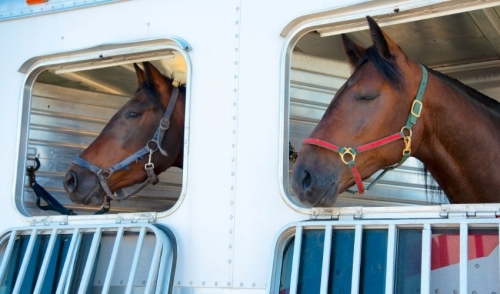
Is Your Horse Stressed Out?
Every animal can experience stress and may react to different stressors in different ways. Understanding if your horse is stressed out can help you calm the animal for a more comfortable, healthier life and an easier relationship between you and your equine partner.
What Causes Stress for a Horse?
Many different stressors can be part of a horse’s life. Horses with a calm, easygoing temperament are less likely to get stressed out by common issues, while more high-strung animals can be stressed much more easily. Common stressors include…
- Changes in Routine – All animals are more comfortable with familiar habits and routines, and changing a horse’s routine can cause anxiety and stress. This might be a change in feeding or exercise schedules, new riders, unfamiliar surroundings, or new gear the horse is not accustomed to using.
- Poor Diet – An unhealthy diet can lead to poor health, which is stressful for a horse. Pain, gastric discomfort, and other ailments caused by inadequate nutrition can all add to a horse’s stress. Changing feeds or forage options can also be stressful, not only because of nutritional changes but also because of changes in the feeding routine.
- Travel – Both frequent travel and infrequent travel can cause stress for a horse. A busy travel schedule disrupts the animal’s routine and causes confusion and anxiety, even if the horse is used to being transported. On the other hand, a horse that has not been transported regularly can easily be stressed by even a simple, short trip.
- Confinement – Horses are prey animals with a strong flight instinct when they feel threatened. When a horse is confined to a stall for long periods, that can create significant stress. This is particularly true if the stall may be too small for the animal. Even a small corral without sufficient space can add to a horse’s stress and anxiety.
- Noise – Most horses will become accustomed to low levels of local noise, but sharp, loud, or unexpected sounds can be very stressful. This might include nearby traffic, gunshots, slamming doors, barking dogs, construction equipment, or even loud music. The more unusual and abrupt the sound, the more stressful it will be.
- Temperature Extremes – Extreme climates can be stressful for a horse, particularly if the animal is not accustomed to the climate after a recent move or relocation. Very high or low temperatures can be stressful, as can constant rain, high winds, high humidity, or frequent severe storms.
- Medical Treatment – Whether it is medication administration, dental work, vaccinations, or any other unusual treatment, a horse can be stressed by medical procedures. This can also include pregnancy and reproductive stresses, as well as injuries or illnesses, especially if the veterinarian may be unfamiliar or different vets are used.
How Stress Affects Horses
Stress is a part of every animal’s life, but excessive or long-term stress can have strong physiological and psychological impacts on a horse. Depending on the levels of ongoing stress and the horse’s individual constitution, stress can cause…
- Elevated hormones that may throw off reproductive cycles
- Mood changes, particularly anxiety and nervousness
- Weakened immune system and greater susceptibility to illness
- Weight loss or overall loss of condition
- Gastric ulcers, diarrhea, and other digestive issues
- Poor focus or performance in training and shows
Because these symptoms are relatively indistinct and could indicate a wide variety of health problems, it is best to consult a veterinarian if your horse shows any of these signs, in case a medical diagnosis and treatment is necessary.
How to Tell if Your Horse is Stressed
Not all stressors will affect all horses the same way. Some horses will show stress, nervousness, and anxiety very quickly, while other animals may not show strong outward signs of their distress. Behavioral changes are some of the best clues that a horse is stressed, and could range from flared nostrils, pawing and the ground, and tooth grinding to pacing, fence walking, rearing, kicking, and biting. When a horse is under acute stress, symptoms such as trembling, sweating, and vocalizing are often noticeable. Any sudden change in behavior or attitude can indicate stress, and such signals should always be taken seriously for the safety of the horse as well as its rider or handler.
Make Your Horse’s Life Less Stressful
While it may be impossible to eliminate every source of stress from your horse’s life, there are many ways to help reduce stress overall so the animal does not suffer from long-term, excessive stress.
- Keep a consistent daily routine for feeding, grooming, and exercise regimens.
- Provide more turnout time in a large corral with plenty of space.
- Choose a spacious stall with good air circulation and room for the animal to move.
- Provide a healthy diet that will meet the horse’s nutritional needs.
- Provide a consistent source of clean, fresh water for adequate hydration.
- Introduce the horse slowly and carefully to new animals, handlers, or riders.
- Schedule regular preventative medical care with a familiar veterinarian.
- Provide regular mental enrichment to stimulate the horse and keep it entertained.
- Consider introducing a companion animal to meet the horse’s herd instinct.
- Be careful with travel arrangements and be sure they are smooth and comfortable.
Most of all, take time to bond with your horse and be familiar with the animal’s moods, preferences, and stressors. The more aware you are of what the horse needs, the more quickly you will notice if there are any difficulties and you can correct them before your horse is under undue stress.
